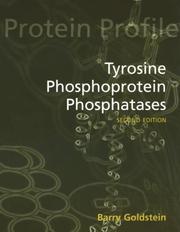| Listing 1 - 10 of 151 | << page >> |
Sort by
|
Book
ISBN: 0128094451 0128094001 9780128094457 9780128094006 Year: 2017 Publisher: London, England : Academic Press,
Abstract | Keywords | Export | Availability | Bookmark
 Loading...
Loading...Choose an application
- Reference Manager
- EndNote
- RefWorks (Direct export to RefWorks)
Book
Year: 2012 Publisher: Bruxelles: UCL,
Abstract | Keywords | Export | Availability | Bookmark
 Loading...
Loading...Choose an application
- Reference Manager
- EndNote
- RefWorks (Direct export to RefWorks)

ISBN: 0198502478 Year: 1998 Publisher: Oxford : Oxford university press,
Abstract | Keywords | Export | Availability | Bookmark
 Loading...
Loading...Choose an application
- Reference Manager
- EndNote
- RefWorks (Direct export to RefWorks)
Article
Abstract | Keywords | Export | Availability | Bookmark
 Loading...
Loading...Choose an application
- Reference Manager
- EndNote
- RefWorks (Direct export to RefWorks)
Amino-acids. --- Mice. --- Tyrosine.
Article
Abstract | Keywords | Export | Availability | Bookmark
 Loading...
Loading...Choose an application
- Reference Manager
- EndNote
- RefWorks (Direct export to RefWorks)
Blockade. --- Endogenous. --- Norepinephrine. --- Tyrosine.
Book
Abstract | Keywords | Export | Availability | Bookmark
 Loading...
Loading...Choose an application
- Reference Manager
- EndNote
- RefWorks (Direct export to RefWorks)
Dissertations --- Tyrosine --- Medical sciences
Article
Year: 2001
Abstract | Keywords | Export | Availability | Bookmark
 Loading...
Loading...Choose an application
- Reference Manager
- EndNote
- RefWorks (Direct export to RefWorks)
Article

Year: 1993 Publisher: [S.l.] : [s.n.],
Abstract | Keywords | Export | Availability | Bookmark
 Loading...
Loading...Choose an application
- Reference Manager
- EndNote
- RefWorks (Direct export to RefWorks)
Swine --- Farmyard manure --- Tyrosine
Book
ISBN: 9789175196855 Year: 2013 Publisher: Linkopings Universitet
Abstract | Keywords | Export | Availability | Bookmark
 Loading...
Loading...Choose an application
- Reference Manager
- EndNote
- RefWorks (Direct export to RefWorks)
This dissertation by Amanda Nordigården focuses on the FLT3 tyrosine kinase receptor's role in acute myeloid leukemia (AML). It explores the mutations of FLT3, particularly internal tandem duplications (FLT3-ITD), which are frequently observed in AML and are associated with poor prognosis and relapse. The research investigates the signaling pathways and drug resistance mechanisms in FLT3-ITD mutations, aiming to improve therapeutic strategies. Key findings include the identification of apoptotic mechanisms and the potential of canertinib, a pan-ERBB inhibitor, as a treatment option. The work contributes to the understanding of FLT3 mutations and their impact on AML treatment, offering insights into potential therapeutic advancements.
Leukemia. --- Protein-tyrosine kinase. --- Leukemia --- Protein-tyrosine kinase
Book
ISBN: 9789176856031 Year: 2017 Publisher: Linkopings Universitet
Abstract | Keywords | Export | Availability | Bookmark
 Loading...
Loading...Choose an application
- Reference Manager
- EndNote
- RefWorks (Direct export to RefWorks)
This dissertation by Cynthia Veenstra investigates the roles of the receptor tyrosine kinase Met and protein tyrosine phosphatase PTPN2 in breast cancer. It explores potential prognostic and predictive biomarkers across different breast cancer subtypes, such as luminal, HER2-positive, and triple-negative breast cancer (TNBC). The study examines gene copy numbers and protein expression levels of MET, EGFR, HGF, and PTPN2 in patient cohorts, finding correlations with survival outcomes. The research indicates that high MET and EGFR amplifications are associated with poor survival in TNBC, while PTPN2 loss affects prognosis in luminal and HER2-positive cancers. The work aims to inform future treatment strategies and is intended for medical researchers and oncology professionals.
Protein-tyrosine kinase. --- Biochemical markers. --- Protein-tyrosine kinase --- Biochemical markers
| Listing 1 - 10 of 151 | << page >> |
Sort by
|

 Search
Search Feedback
Feedback About UniCat
About UniCat  Help
Help News
News